Advertisement
New Insight Into Breast Cancer’s Spread After Surgery Suggests Way To Thwart It

For years, some women who had been told that their breast cancer was relatively harmless have been unhappily surprised by a recurrence just a year or two after surgery.
Now, new research from MIT and the Whitehead Institute finds that their surgery may have had something to do with the spread -- but it’s not their doctors’ fault.
The body’s own mechanism for healing seems to have unleashed cancerous cells that had already traveled outside the breast, according to the study, published Wednesday in Science Translational Medicine.
“The post-surgical wound-healing response somehow releases already disseminated cells, cells that have already spread to distant sites in the body, releasing them from the constraints that have previously prevented them from growing actively,” says professor Robert Weinberg, the new study’s senior author.
To repair a wound, the immune system sends cells around the body, and promotes cell and blood vessel growth -- all of which can also fuel cancer. Without the immune system tamping down such activities, cancer cells can seed new tumors that are far more dangerous than the initial growth in the breast, Weinberg says.
In breast cancer, the vast majority of patients are not harmed by their initial tumor, but by its spread into other parts of the body, such as the brain. Studies have shown a spike in breast cancer metastases 12 to 18 months after a lumpectomy or mastectomy.
The new research contradicts the idea that surgeons might be releasing cancerous cells that then travel to other parts of the body. Some surgeries are for relatively harmless noninvasive tumors, Weinberg says, and there is so much tissue removed surrounding the tumor that it isn’t really feasible for the operation to be spreading cancerous cells.
“The other, alternative mechanism involves an effect on somehow stimulating already seeded metastases at distant sites that were hitherto silent and not obvious, and somehow liberating them from whatever has been preventing them from proliferating,” Weinberg says. This is what he thinks is going on in breast cancers that recur within a year or two of surgery.
The good news is that Weinberg’s team found a way to counter this effect in mice -- and research in people has already pointed in the same direction.
In the new study, they found that mice given a strong anti-inflammatory drug around the time of surgery did not get surgery-related metastases.
“An anti-inflammatory actually does prevent the wound healing from suppressing the immune system,” Weinberg says.
“Mice are not people and therefore this may not translate into clinical practice,” he adds. “Our paper is only intended to alert people to this possibility and to explore whether this mechanism operates as well in humans as we think it might.”
Although there are no definitive studies yet, early research in people is promising. Giving non-steroidal anti-inflammatory drugs, or NSAIDs, at the time of surgery is associated with a decline in metastases.
In one 2012 study, for instance, breast cancer patients given the anti-inflammatory drug ketorolac during surgery were five times less likely to have their cancer spread than people who didn’t get the painkiller, says Dr. Michael Retsky, an oncology researcher at The Harvard T.H. Chan School of Public Health and University College London, who led that research.
Many surgeons are hesitant to give NSAIDs during surgery, fearing they will lead to extra bleeding, but Retsky says it’s likely that any additional bleeding will be manageable.
It’s not yet clear whether particular NSAIDs will give more benefit than others, or what’s the best dose or timing to deliver the drug.
Dr. Andrew Chan, a gastroenterologist at Massachusetts General Hospital and Harvard Medical School, says his research with aspirin suggests that different NSAIDs may affect the body differently. In people, aspirin seems to have stronger anti-cancer properties than other NSAIDS, but the opposite is true in animals, he says.
Chan is leading a study looking at the role of aspirin in preventing cancer recurrence -- but his focus has been on the long term, he says, not on the time of surgery.
Retsky says that it will be important to run clinical trials to confirm any benefit from NSAIDs and determine the safest, most effective drug and dose. He hopes such a study will begin soon in Nigeria, where there are few painkillers available for surgical patients.
Closer to home, Retsky says there’s enough circumstantial evidence that he knows what he would do if he -- or more likely his wife -- needed breast cancer surgery in the meantime. “I would use ketorolac,” he says.
